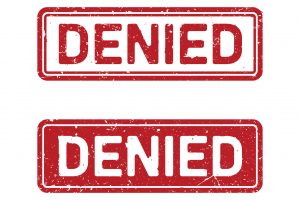Most applicants for Supplemental Security Income (SSI) or Social Security Disability Insurance (SSDI) automatically consider the justifications for why they should be given benefits. However, it could be helpful to view things from the other side and comprehend the reasons why your application for SSDI or SSI benefits might be rejected. The causes may occasionally be out of your control. In other circumstances, you might be able to avoid taking a step that leads to a rejection.
Remember that PLBH can help you with filing a claim, disability hearings, and the appeals process. Contact us at (800) 435-7542 to learn more.
Your income is too high
One of the most common reasons you could be denied benefits for SSDI, the benefit program for employees who have paid into the Social Security system over a number of years, is that you are working more than the minimum amount that qualifies as “substantial gainful activity” at the time of application (SGA).
This means that you make too much money to qualify as disabled. When you apply for and get SSDI, you are permitted to work a modest amount, but not more than the SGA cap, which is $1,310 per month in 2021. Every year, the amount is modified. Only income from employment counts toward the SGA since it demonstrates your capacity to work; money from investments is not included.
Your disability isn’t severe enough or won’t last long enough
The Social Security Administration (SSA) must feel that your disability is severe enough to last at least 12 months or result in your death for you to be eligible for SSDI or SSI benefits. The only group of candidates for SSI who are blind are exempt from this time limit.
Many claims are rejected because they are not anticipated to result in incapacity for 12 months, such as those based on bone fractures from acute trauma, such as car or motorcycle accidents. Bone fractures generally heal in less than a year. However, the SSA is likely to believe your handicap will continue a year if you have serious bone fractures that haven’t healed after six months. Every situation is assessed on an individual basis.
The SSA is not able to get ahold of you
You must be able to communicate with the SSA and Disability Determination Services (DDS), the organization that assesses your medical eligibility for benefits, regarding your application. Your benefits can be withheld if these organizations are unable to get in touch with you to arrange appointments or contact with you about important issues.
You might not need to contact the SSA if you designate a representative (such as an attorney) to handle your paperwork, but make sure to keep in touch with them. Make sure the SSA has your contact information if you relocate while your application is being reviewed. Every day, applicants for Social Security disability benefits are turned down because the SSA cannot locate them.
The SSA does not have access to your medical records
For your disability to be approved, your medical records are essential. Your claim is likely to be rejected if you refuse to give the SSA access to such data. Similar to this, the SSA can want further details concerning your disabilities, either because the medical records of your treating doctor are lacking or because you don’t have a regular treating physician.
In certain situations, the SSA will ask that you undergo a consultative examination (CE), often known as a medical examination, by an SSA physician at taxpayer expense. The SSA may occasionally ask you to take more than one CE. You risk being denied disability due to insufficient medical information or non-attendance at the CE if you choose to decline to go or ask the SSA to rely its decision on the medical documents already in your file.

